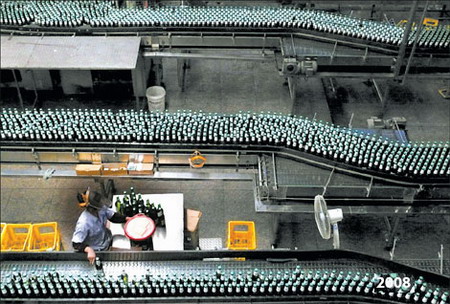
|
BIZCHINA> Wen's Lens
 |
|
Related
Moving up
By You Nuo (China Daily)
Updated: 2008-08-11 15:00
 
The place where the 1987 black-and-white picture was taken is well known, the industrial town of Jingdezhen, China's ancient pottery and porcelain city. And that's why people still saw a lot of work being done with ancient methods as recently as the 1980s, in quite simple, if not primitive, working conditions. The place where the beer production line was photographed was somewhat of a surprise to Wang Wenlen, our photographer. It was in Chun'an, a scenic and traditional rice growing county on the border between Zhejiang and Anhui provinces. This used to be the territory of huangjiu, a brownish rice wine similar to saki and made according to the local villagers' recipes. But seeing is believing. Many of the younger generation prefer bottled beer now - something that from its very concept to its production process used to be alien to the men and women toiling in the paddy fields. So the economic reform, which Chinese officials say officially kicked off in 1978, has never been as simple as replacing old factories with new ones. Along with industrial capital (a good part of it from abroad) China has also imported a lot of new ways of operating, from business laws to managerial practices. On a deeper level, there was also a change of lifestyles. If consumers are denied many basic choices, as they had been in the 1960s and 70s, who would have invested in a beer brewery? For the planners at that time to produce beer for rice farmers would have been considered a grave mistake, political as well as economic, because farmers were supposed to stick to their rice wine and never switch to urban bourgeois beer. Any attempt to do so would also have been thought of as a waste of precious public resources. But once there is a market and consumer choice is accorded due respect, it's not just that the old factories have vanished but also that new demands and new tastes have appeared at a rate that people could not have imagined. Incidentally, for those who have no idea how advanced some of China's factories can be, it should be pointed out that the beer production line here by no means represents the top level. See the fan? It is still not air-conditioned. Someone in the factory has to plan for more changes.
(For more biz stories, please visit Industries)
|
a级毛片av无码